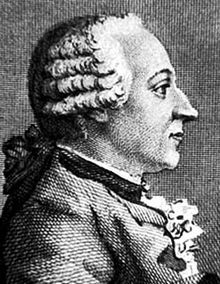Correspondance littéraire, philosophique et critique
Correspondance littéraire, philosophique et critique or Correspondance littéraire, philosophique et critique adressée à un souverain d'Allemagne was a publication distributed exclusively in handwritten form, which appeared in Paris between 1753 and 1790 and was sent to a select, aristocratic readership throughout Europe .
founding
It was founded by Guillaume Thomas François Raynal under the title Nouvelles littéraires and appeared under his aegis from 1747 to 1753. In the same year 1753, Friedrich Melchior Grimm took over the management, changed the name to Correspondance littéraire, philosophique et critique , which he led until 1775 before handing it over to Jakob Heinrich Meister , his long-time secretary. Grimm began to report with literary portraits, anecdotes, reviews and stories from the social, cultural and artistic life of the metropolis, but also - enough for the comprehensive philosophy of the Enlightenment - to inform about news in the scientific and technical field.

With his reports - which were not printed in order to circumvent the strict censorship requirements , but copied by hand and sent by diplomatic mail as a letter - Grimm initially (1759) only supplied three or four subscribers , most recently to more than a dozen European royal courts and their aristocracies , which also resulted in isolated cases privileged readers from the bourgeoisie were provided with current affairs, assessments and opinions of the social life of Paris and France. Grimm's reports appeared in loose fortnightly, later monthly intervals and - according to their title - were written as magazine-like letters. The articles in the Correspondance were of the most varied kinds, thematically broadly diversified, discreetly subjective and thoroughly critical. There were reports on artistic events, such as plays or musical performances, as well as philosophical and scientific topics and their assessment, right up to social gossip. However, discussions of new publications on the book market took up a large part of the space. Later, reflections on the political and social life of France were included to a greater extent.
Grimm did not write the correspondance alone. Diderot , d'Alembert , Rousseau , the Swiss writer Jacob Heinrich Meister and others also worked as authors on this periodical .
Five years after Grimm's death, a printed selection of articles from Correspondance from 1770 to 1782 appeared for the first time in 1812. The anonymously published publication named a “sovereign campaign d'Allemagne” as the addressees, and only Grimm and Diderot as authors, but not Meister. It sparked a scandal, the living salon visitors, whose statements Grimm had reproduced and assessed in his reports, were stunned and felt that they had been compromised, the discretion of the salons and the confidentiality of the communications broken. Thereupon, Meister, who had meanwhile emigrated to London, decided to publish the Correspondance himself anonymously in printed form, but because of his absence from Paris it was not up to date. The last delivery appeared in 1813.
List of subscribers (selection)
- August of Saxe-Gotha-Altenburg
- Catherine II (Russia)
- Luise Ulrike of Prussia
- Friedrich August II.
- Stanislaus I. Leszczyński
- Karl August of Saxe-Weimar
- Christian Friedrich Karl Alexander of Brandenburg-Ansbach
- Friedrich II (Prussia)
literature
- Joseph R. Smiley, The Subscribers of Grimm's Correspondance Litteraire . In: Modern language notes , Vol. 62 (1947), n ° 1, p. 44-46.
- Bernard Bray, Jochen Schlobach, Jean Varloot (eds.): La Correspondance littéraire de Grimm et de Meister (1754-1813), actes du coll. De Sarrebruck des 22-24 février 1974 , Klincksieck, 1976, ISBN 978-2-252 -01787-6 .
- Véronique Marracci-Roy: La Correspondance littéraire (...) de 1776 à 1789: écrire et lire un périodique des princes éclairés d'une révolution à l'autre Jean Goulemot, Université François Rabelais, Tour, (1999) , ISBN 978- 2-7295-4029-6
- Dena Goodman: The Republic of Letters: A Cultural History of the French Enlightenment. Cornell Univ. Press (1996) ISBN 0-8014-8174-0
Web links
- Center international d'étude du XVIIIe siècle, c18
- "CORRESPONDANCE LITTÉRAIRE, PHILOSOPHIQUE ET CRITIQUE" A BRIDGE BETWEEN FRANCE AND GERMANY IN THE 18th CENTURY Published in: VIA REGIA - Sheets for international cultural communication issue 36/37 1996, published by the European Culture and Information Center in Thuringia
- The ARTFL Project. Grimm's Correspondance littéraire. Department of Romance Languages and Literatures. The University of Chicago
- Denis Diderot, Friedrich Melchior Grimm: Correspondance littéraire, philosophique et critique: adressée a un souverain d'Allemagne. F. Buisson (1812), online
See also
Individual evidence
- ↑ Gertrud Muraro-Ganz: Meister, Jakob Heinrich. In: New German Biography (NDB). Volume 16, Duncker & Humblot, Berlin 1990, ISBN 3-428-00197-4 , p. 726 f. ( Digitized version ).
- ↑ Christina Randig: Under the seal of secrecy. Friedrich Melchior Grimm reported from Paris in his "Correspondance" from 1754 to a select group of readers . FAZ No. 7 of January 9, 2013, p. N4
- ↑ Werner Greiling; Andreas Klinger; Christoph Köhler: Ernst II of Saxe-Gotha-Altenburg. A ruler in the Age of Enlightenment. Böhlau-Verlag (2005) ISBN 3-412-19905-2 , p. 215
- ↑ Writings on art. selected and with an afterword by Peter Bexte, Philo & PhiloFineArts, Berlin (2005) (Fundus, Vol. 157), ISBN 978-3-86572-412-0 , p. 308 ( PDF file; 134 kB ( Memento from 12 November 2013 in the Internet Archive ))
